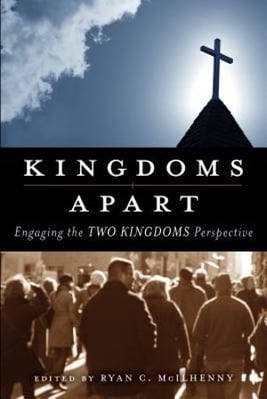
I am really pleased to welcome (again) Matthew Tuininga to Mere-O. A Ph.D. candidate at Emory University, Matthew is one of the sharpest young Christian voices working at the intersection of religion and politics. I commend his blog to you highly. – MLA
The dust jacket of Ryan McIlhenny’s new book Kingdoms Apart declares that the book “focuses on the two competing positions rooted in the Reformed tradition: neo-Calvinism, a nineteenth-century school of thought associated with the Calvinist polymath Abraham Kuyper, and the Two Kingdoms perspective.” I’m not sure who wrote this description but in many ways it is misleading, if for no other reason than that one of the main things I take away from the book is that there are not “two competing positions” rooted in the Reformed tradition. Not only do the perspectives of the authors range from a moderate Kuyperianism to a more radical form of neo-Calvinism, and not only does the book clearly argue that John Calvin’s two kingdoms perspective should be distinguished from the proponents of “the” Two Kingdoms perspective being disputed in the book, but many of the book’s authors either acknowledge or implicitly demonstrate their own reliance on a version of the two kingdoms paradigm. In that sense the book’s subtitle on the front, “Engaging the Two Kingdoms Perspective,” is more accurate than the description on the back.
(Note: Throughout this essay I capitalize Two Kingdoms when referring to the particular perspective the authors are engaging, which they associate with David VanDrunen, Darryl Hart, Michael Horton, and Jason Stellman. When referring to broader two kingdoms thought such as that of John Calvin, I leave the term uncapitalized.)
The book begins with a forward by James Skillen and an introduction by Ryan McIlhenny, both of which defend a neo-Calvinist account of creation redeemed in response to the Two Kingdoms perspective. But McIlhenny’s defense is of a chastened and moderated neo-Calvinism, informed by McIlhenny’s own sympathies with two kingdoms logic. In the last chapter of the book, which he also writes, he defends not so much a model of Christian engagement transforming culture as he does a model of Christian witness as redeemed culture. I’ll return to McIlhenny’s argument below because I think it is probably the most helpful contribution of this book.

The second and third chapters of Kingdoms Apart are parallel accounts of the degree to which the most prominent Two Kingdoms advocate, David VanDrunen, accurately describes the two kingdoms doctrine of John Calvin. I am particularly interested in these chapters because John Calvin’s two kingdoms doctrine is the subject of my dissertation at Emory University. The first, by Cornel Venema, is the more polemical and critical of the two. Venema helpfully illuminates some of the different emphases between Calvin’s theology and that of VanDrunen, but his description of VanDrunen’s project appears in language VanDrunen never uses (i.e., an “ecclesiastical kingdom”; “two hermetically-sealed realms”) and that obscures the ambiguity and depth of VanDrunen’s project. Venema’s own reading of Calvin is somewhat thin at points (he portrays Calvin’s two kingdoms doctrine as largely an explanation in lieu of the Anabaptists of why Christians should submit to civil government) and perhaps a little too colored by Venema’s neo-Calvinist commitments, although Venema does make the helpful point that “Calvin suffered no illusions regarding the renovation of human life and the restoration of all things to proper order prior to the consummation of all things at Christ’s second advent” (31).
Gene Haas is also critical of VanDrunen’s account of Calvin on natural law and the two kingdoms, but Haas’s criticism is more about VanDrunen’s emphasis (i.e., he exaggerates the distinction between the two kingdoms as well as Calvin’s optimism about human knowledge of the natural law in civil matters) than it is about the substance of his argument. Haas’s own account of Calvin’s two kingdoms perspective is excellent, highlighting the close connections Calvin drew between the two kingdoms and the doctrine of the church, especially pertaining to the unique character of church discipline. Haas rightly portrays Calvin’s two kingdoms doctrine as an eschatological distinction between Christ’s spiritual kingdom, which appears fully only at Christ’s return, and the concerns of the present life (the political or civil kingdom); even as the institutional structures of this age (such as the civil jurisdiction) are to submit to Christ and his word, they should nevertheless not be confused with Christ’s spiritual kingdom. “Believers have the tension of living both for the eschatological realities of Christ’s return and for the social realities of a sinful world” (55).
I describe these chapters on Calvin at length because in some ways the greatest weakness of the book is that the authors largely avoid clarifying the relation of their theologies of creation and redemption to the broader two kingdoms theology articulated by figures like Calvin. This obscures the degree to which many of them maintain the reformer’s basic two kingdoms commitments, despite their criticism of the contemporary Two Kingdoms perspective.
There is no need for me to summarize every chapter of the book but I do want to highlight some significant arguments in a few chapters.
Login to read more
Sign in or create a free account to access Subscriber-only content.
